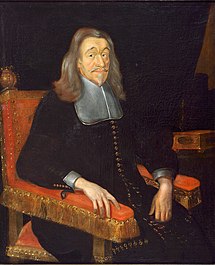Ernst I, Duke of Saxe-Gotha
| Ernest I | |
|---|---|

Ernest I, the Pious
|
|
| Duke of Saxe-Gotha and Altenburg | |
| Reign | 1672–1675 |
| Successors | Frederick in Saxe-Gotha-Altenburg Albrecht in Saxe-Coburg Bernhard in Saxe-Meiningen Heinrich in Saxe-Römhild Christian in Saxe-Eisenberg Ernst in Saxe-Hildburghausen Johann Ernst in Saxe-Saalfeld |
| Duke of Saxe-Gotha | |
| Reign | 1640–1675 |
| Predecessor | Johann |
| Born |
25 December 1601 Altenburg, Duchy of Saxe-Weimar, Holy Roman Empire |
| Died | 26 March 1675 (aged 73) Schloss Friedenstein, Gotha, Saxe-Gotha, Holy Roman Empire |
| Consort | Elisabeth Sophie of Saxe-Altenburg |
| Issue |
Elisabeth Dorothea, Landgravine of Hesse-Darmstadt Frederick I, Duke of Saxe-Gotha-Altenburg Albert, Duke of Saxe-Coburg Bernhard I, Duke of Saxe-Meiningen Henry, Duke of Saxe-Römhild Christian, Duke of Saxe-Eisenberg Princess Dorothea Maria Ernest, Duke of Saxe-Hildburghausen Johann Ernest IV, Duke of Saxe-Coburg-Saalfeld |
| House | House of Wettin |
| Father | Johann II, Duke of Saxe-Weimar |
| Mother | Dorothea Maria of Anhalt |
| Religion | Lutheranism |
Ernest I, called "Ernest The Pious" (Altenburg, Duchy of Saxe-Weimar 25 December 1601 – Schloss Friedenstein, Gotha, 26 March 1675), was a duke of Saxe-Gotha and Saxe-Altenburg. The duchies were later merged into Saxe-Gotha-Altenburg.
He was the ninth but sixth surviving son of Johann II, Duke of Saxe-Weimar, and Dorothea Maria of Anhalt. His mother was a granddaughter of Christoph, Duke of Württemberg, and great-granddaughter of Ulrich, Duke of Württemberg.
Left an orphan early in life (his father died in 1605 and his mother in 1617), he was brought up in a strict manner, and was gifted and precocious but not physically strong. He soon showed traits of the piety of the time. As ruler, by his character and governmental ability as well as by personal attention to matters of state, he introduced a golden age for his subjects after the ravages of the Thirty Years' War. By wise economy, which did not exclude fitting generosity or display on proper occasions, he freed his land from debt, left at his death a considerable sum in the treasury, and reduced taxation. Public security and an incorruptible and efficient judiciary received much of his attention, and his regulations served as models for other states.
He did not rise far enough above his time to do away with torture, though he restricted it, and in the century of trials for witchcraft he yielded to the common delusion, though he was not otherwise inclined to superstition and was a foe of alchemy. He prohibited dueling and imposed the death penalty for a mortal result.
...
Wikipedia
